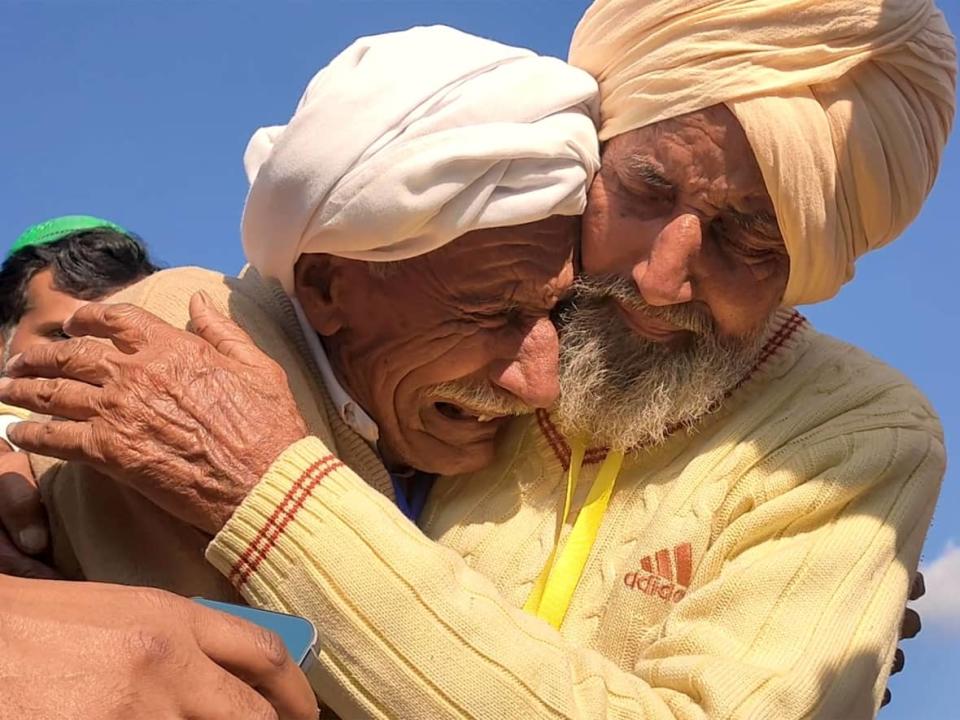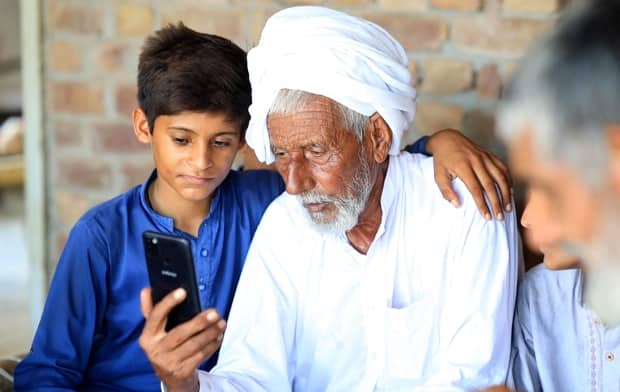Separated by India's partition 75 years ago, brothers just want to spend remaining time together

It was a moment more than 74 years in the making.
Earlier this year, at a recently opened border crossing between India and Pakistan, Sadiq Khan collapsed into the arms of his younger brother, Sikka, tears of joy and sorrow overwhelming the two men as the decades they spent apart melted away.
The brothers hadn't seen each other since August 1947, the year their family was torn apart by the violence and chaos of the partition of British India into two separate countries, India and Pakistan.
For decades, neither man knew if the other was even alive.
"I had been trying to find my brother forever," Sikka Khan, 75, told CBC News last week at his home in the village of Phulewal, in India's northern Punjab state.
"Whenever someone would go to Pakistan, I'd ask about my brother, to see if he was there or not. I even wrote letters that never got to him, but I never found out anything about my brother."
Search started on YouTube
The reunion in January 2022 came about by chance, through social media. A friend from Sikka's village stumbled upon a YouTube channel, Punjabi Lehar, that works to reunite loved ones who have been separated since 1947.
WATCH | Brothers divided by partition of India reunited:
The channel's founder, Nasir Dhillon, lives in the same city as the elder Khan brother and helped set up an initial video call between the two brothers. He then worked for months to organize their first in-person meeting.
The emotional video of the two brothers finding each other again quickly went viral. In it, you can hear Sadiq, now in his mid-80s, telling his brother, "Don't cry — God has finally reunited us."
As India and Pakistan mark the 75th anniversary of their respective independence, Facebook pages and YouTube channels have become increasingly popular in helping connect loved ones who were separated during the violence that accompanied the 1947 partition.
PHOTOS | India marks the 75th year of independence:
There is even a push, spearheaded by younger generations, to use virtual reality to help those elderly survivors who want to see the homes and villages they left behind more than seven decades ago but are unable to travel.
'The inspiration came from my elders'
According to Dhillon, in the seven years it has been online, the Punjabi Lehar YouTube channel has been instrumental in approximately 300 reunions. He told CBC News that the successful reunions are what makes the project worth the effort it takes to maintain the channel.
"The inspiration came from my elders, my dad, my grandfather," Dhillon, 38, said.
On Aug. 15, 1947, British rule over India ended in a hastily organized retreat, and the subcontinent was divided into two nations split along religious lines, with a Hindu-majority but officially secular India and a mainly Muslim Pakistan.
It was a violent split that sparked deadly riots. About 15 million people were displaced, triggering one of the biggest mass migrations in history.
Muslims, Hindus and Sikhs on both sides of the newly created border were forced to move. Many had to board trains that were packed full and were ambushed along the way. Some trains reportedly pulled up to stations with the passengers all dead.
It's estimated more than a million people lost their lives in the riots that followed partition as religious tensions boiled over.
Running for his life
Before the bloodshed, the Khan family lived in Punjab's Ludhiana district on the Indian side. But Sikka, who was not yet one year old, and his mother were visiting her home village farther east in India when news came that the country was to be partitioned.

Sadiq, 10 years old at the time, was with his father and eight-year-old sister, and they were caught up in the violence. They tried to hide at first, as did other Muslims in their village, Jagraon.
"The rioters smashed our mud roofs with torches, and many women, children and the elderly died," Sadiq said in an interview with CBC from his current home in Faisalabad, in northeastern Pakistan.
His father was killed in the clashes; his sister got sick on her way to a refugee camp and also didn't make it.
Sadiq remembers being escorted by the Pakistani military, along with other Muslims fleeing India, to the new country to the east. The only other family member who survived was an aunt.
"At night, we walked over dead bodies to reach the [refugee] camp," he recalled.
That experience was made all the more chilling when he lost a shoe and was told to forget it and run in order to make it out alive.
He won't ever forget the horrors, Sadiq said, which he likened to living through hell.
"What happened is deeply rooted in our hearts. The memories flash in front of my eyes," he said.
'The people around me came and saved me'
Sadiq only recently found out from his younger brother that in the chaos of the forced displacement, their mother — grief-stricken and traumatized when she couldn't find the rest of her family after weeks of violence — ended up drowning herself.
Sikka, just six months old, was taken in by a Sikh family in his mother's village, which was helping to shelter their Muslim neighbours.
"The people around me came and saved me," said Sikka.
Until they were reunited this year, neither brother knew the fate of the parent who was with the other.
The brothers are grateful to Dhillon and others behind the YouTube channel that brought them back together. They also credit the media attention that their viral video received for reducing visa wait times, which has allowed them to visit each other twice since their initial reunion for extended weeks at a time.

Both India and Pakistan, close neighbours with tense relations, maintain strict visa conditions that regulate who can cross the border.
Calls for freer movement across border
For all of the heartbreak, Sikka said he and his brother are more fortunate than other families torn apart by partition. He has a simmering anger toward the governments of both countries and would like to see visa restrictions eased so Indians and Pakistanis can move across the border comfortably.
"I don't know why we are still fighting. What are the reasons?" he said. "Why should the families suffer?"
Now that they have finally found each other, the Khan brothers make do with their physical separation by setting up frequent video calls. They chat at length, trading news, with the younger brother often asking Sadiq to tell him about his family or to point out relatives in old photos.
They frequently bicker, just like brothers who've grown up together. But they agree on what they want now: to cherish the time they have left.
"Both of us are old," said Sadiq. "Our only wish is that we get our visas as soon as possible so we can stay together."
"We feel like staying together now, always," echoed his brother. "Here in India or there [in Pakistan], as long as we are together — we do not want to stay apart."
WATCH | India celebrates 75 years of independence from British colonial rule:

 Yahoo Sports
Yahoo Sports 